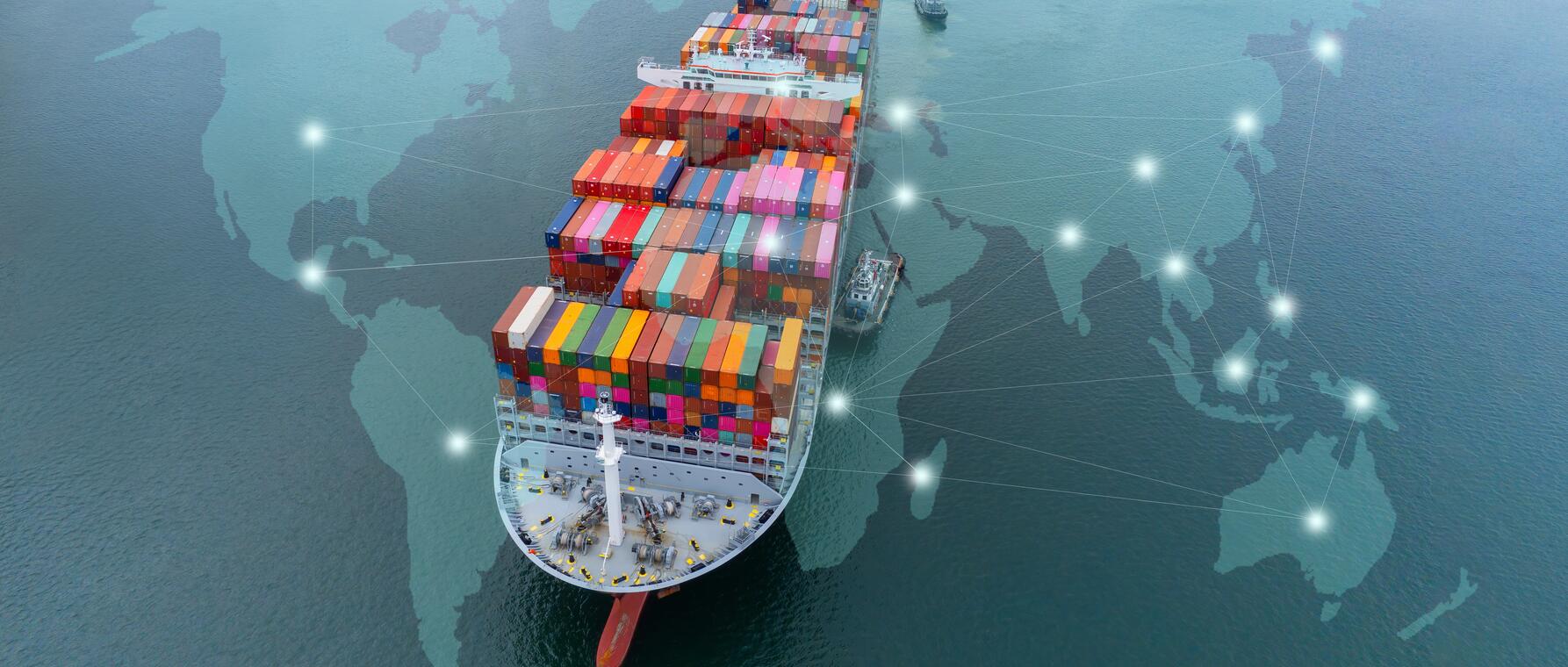How Much Pain Will New Tariffs Bring—and For How Long?
Economist Justin Wolfers, PhD '01, says levies could have a dramatic and long-lasting impact on consumers and the US economy

Research at Risk: Since World War II, universities have worked with the federal government to create an innovation ecosystem that has yielded life-changing progress. Now much of that work may be halted as funding is withdrawn. Find out more about the threats to medical, engineering, and scientific research, as well as how Harvard is fighting to preserve this work—and the University's core values.
On April 2, the Trump administration announced wide-ranging tariffs on US trading partners, starting with a 10 percent baseline levy on all imports, extending to 20 percent, 26 percent, and 34 percent on imports from the European Union, India, and China, respectively. The tax on Chinese imports adds to existing levies.
Justin Wolfers, PhD '01, a professor at the University of Michigan and one of the International Monetary Fund’s "25 Economists Under 45 Who Are Shaping the Way We Think About the Global Economy," says this set of tariffs, unlike those from President Trump's first term, will have dramatic effects on the US economy. Contrary to the administration's claims, the pain for consumers and businesses could be long-lasting.
For readers who haven't taken an economics class in a while, what is the theory of comparative advantage, and how does it relate to trade policy and tariffs?
One of the most important economic problems is that there are a bunch of tasks to be done. How should we divide them? The answer is to allocate each task to the person who can do so at the lowest possible opportunity cost. It's actually kind of obvious. The only tricky part is the term “opportunity cost” rather than just “cost.” We don't want to allocate a task simply to the person who will do it for the fewest dollars; we want to allocate it to the person for whom the cost of the alternative use of their time is not tremendously high.
The macroeconomy works the same way. We have to decide who should write the software for the iPhone and who should put it together. You probably want the software to be written by people who have advanced degrees and tremendous knowledge of computer science. And you probably want the products manufactured in a factory that has access to tremendous amounts of labor. That's why we write the software in the US and have the phones built in China. The result is that Americans get their phones manufactured cheaply, and Chinese people get access to high-quality phones. We both win.
Tariffs make it hard for people to reallocate tasks to do more together than they could apart. That's the whole story. That's why I'm against them.
The Trump administration says tariffs are necessary because other countries have essentially been ripping the US off for decades. Does it have a point? Doesn't China, for instance, engage in unfair trade practices?

There are different kinds of unfair trade practices. Say OpenAI spends a lot of time developing a terrific new algorithm. We've agreed as a globe that if you come up with a new invention, you get to hold the patent and be the only one to use it. That's how we're going to create incentives for research and development. If people steal that intellectual property, it undermines the incentives for innovation and makes the world a worse place. That's a form of unfair practice. I'm not sure it's unfair trade practice, but we might use threats of trade to get people to do less of it. That's one thing.
What people worry about is that China may subsidize a particular industry. Let's say it subsidizes its car industry. What that means is if I want to buy a $10,000 car from China and it costs the factory $12,000 to make, the Chinese government wrote the factory a $2,000 check that still made it profitable for them to sell the car for $10,000.
Well, if you think about it, isn't that kind of wonderful? China is paying people to make stuff cheaply for Americans. It's hard because then I would buy my car from China rather than Detroit, and for a Detroiter, they're going to feel screwed. But let's not leave out of the equation that I just got a cheap car. If China wants to write checks to subsidize my spending, I kind of like it.
In a New York Times op-ed piece, you recently wrote, “This round of tariffs may be 50 times as painful as the ones Donald Trump instituted in his first term.” What do you mean by that exactly?
There's an insight from simple economic theory that the costs of a distortion rise by the square. What that means is a small distortion—for instance, a small tariff—creates small times small losses. A large one creates large times large. That’s where the calculation comes from. The main point here is that it's not worth fighting over small tariffs, but this one matters because it's big. It’s fundamentally distorting economic choices in very expensive ways.
Such as?
Well, what worries economists is not just that a washing machine costs me $100 more. It’s that my life would be better if I had a working washing machine, but because of the tariff, I'm going to be dissuaded from buying one. And so, I'm going to live with this clunky old machine. That's the real cost of the tariff; it distorts the choices that I make and ultimately lowers my standard of living.
On the day your op-ed ran, the Times in another article quoted Stephen Miran, PhD '10, who leads the White House Council of Economic Advisers, as saying, “I don't agree with the argument that Americans are ultimately going to be paying for these tariffs.” What does he mean, and where do you think he gets it wrong?
Say we put a tax on buying Coca-Cola. What would that do? Well, it could be that you'd raise the price of soda. Or it could be that Coke would absorb some of those extra costs and only pass some of them on. A tariff is just like a soda tax, but on imports. And so, as a matter of economic theory, any tax is partly borne by the producer and partly borne by the consumer. That's true of all taxes. How much will be borne by each side depends on what we call elasticity, which is, who has a bunch of other options.
If I'm a soda buyer, but I like orange juice just as much as I like soda, I'll go drink orange juice, and then Coke’s revenue will fall to zero. In that case, Coke can't afford to raise the price. As a result, it will bear all of the burden of the tax. Another possibility is I won’t drink anything but Coca-Cola, and Coke could sell to me, or it could export to Vietnam. Coke has options, so why would it pay the extra tax when it could just sell to Vietnam instead? In that case, the burden of the tax will be borne by the buyer.
Miran's view is that Americans have lots of options instead of buying from importers. And there are some instances where that's the case. You could imagine an expensive pharmaceutical drug where the United States is a huge part of the market. In which case, the seller either sells to America or nowhere.
But what does the empirical evidence say? Well, we have the washing machine tariffs, which happened in 2018. It turns out that when you impose a $100 tariff on washing machines, manufacturers raise the price for Americans by a hundred bucks. So, Americans bear all of the cost.
Now, you could argue that washing machines are a special case. Maybe. But there's a rule of thumb I get from Wall Street people. They say 70 percent of a tax will be passed on to consumers in the form of higher prices, 15 percent will be borne by producers, and 15 percent by the exporting country. I think that's roughly correct. The world looks a lot more like washing machines than it does specialized pharmaceuticals.
The administration acknowledges that the tariffs could cause some pain for consumers, but says it will be short-term. Will it?
What the administration is trying to do is create incentives for companies to build their factories in the United States rather than elsewhere. Put a tariff on T-shirts, and you hope Nike builds a T-shirt factory here. It certainly couldn't produce any sneakers right now because we have zero large-scale sneaker manufacturers in the United States. But we could build factories.
So, if you were Nike and trying to think, “Should we build a sneaker factory in America?” you'd realize it's going to take three or four years to build the factory. Once you've built it, of course, it's going to be around for decades. So, what you're thinking about is not what the economic environment is today; it's what the economic environment will be over the next 50 years. Which means that if you want to convince people to locate manufacturing in America, they have to believe not that you're raising tariffs today, but that tariffs will be high in the future.
Now, let me ask you a question: Do you expect tariffs to be this high in five years?
No idea.
Right. If a Democrat is elected president, it'll be the first thing gone. If it's a Republican, it still might be one of the first things gone. One of the problems is that when we announce a tariff on Monday, we often undo it by Tuesday. So, there's no reason that any business should have confidence that it's been given a regime today that will persist for the 50-year life of a factory. So, we're adopting tariffs, but we're doing it in a way where we'll get none of the upside and all of the downside.
What if we weren’t?
Could it theoretically be possible that there's a way in which there is upside that exceeds the downside? I don't want to get into that. I think the answer is no, but I don't need to argue that because the way they're actually being implemented gives us no long-term upside at all.
You’ve started to address one of the arguments for the tariffs, that they will get global companies to produce more of their products in the United States. Others are that it will lead to more and better-paying jobs for working people, and that the tariffs will generate revenues to, for instance, pay for an extension of the tax cuts enacted during the president's first term. Can you speak to each of those points?
Realize that two of those goals are in direct conflict. The only way to raise a lot of money from tariffs is by paying a lot of import taxes. And the only way to pay a lot of money in import taxes is to import a lot of stuff, which means we didn't bring manufacturing home. So, you either raise a lot of money or you bring industry home. It’s impossible to do both.
Secondly, people say manufacturing is really important. I've never understood why. [Fellow University of Michigan economist] Betsey Stevenson, PhD '01, likes to say that 13 million people work in manufacturing in the United States; 140 million people work outside of manufacturing. It doesn't seem like a great deal to engineer a recession for all of us to help a tiny sliver of the economy.
Then there's this question: Do we want a larger manufacturing sector? Many people take that as a given. And President Trump is right that when he was young, manufacturing jobs were high-wage. But that's not true anymore. Manufacturing jobs now pay less than average. So do we really want to invest all of this in creating a new low-wage industry in the United States?
As an economist, what I want is for workers to be able to make their own decisions. If you want the manufacturing life, great. But if you want the non-manufacturing life, that’s great too. I don't need to reorganize the economy to put a thumb on the scale either way.
There's been some concern about the way the tariffs were calculated for each country—namely, that it was based on our trade deficit with them rather than whether their trade policies/practices were actually unfair. Why does that matter, and how well do you think the big changes in US trade policy have been thought out?
Several weeks ago, Israel dropped all tariffs on imports from the United States. They thought it would be important for geopolitical reasons. But we have a trade deficit with Israel, so therefore, we are going to put tariffs on a country that has no tariffs on our goods. And there are many, many other examples of this.
So, I think the president has a particular economic perspective that is mistaken. But what he doesn't have around him is people willing to look him in the eye and say, That is mistaken, sir. And I can’t help but wonder if that was part of the reason we saw markets fall so dramatically yesterday [April 4].
Finally, when we spoke to you in 2022, inflation had spiked, but you felt pretty good about the recovery from the pandemic and recession. And yet, in survey after survey, voters in the last presidential election said that the economy was their number one concern—particularly the cost of living. Why do you think voters didn’t feel as good about where we were as you did?
I think the answer is very simple: COVID was awful, and life wasn’t the same afterward. It was less awful than it could have been, but still awful. And what we subsequently saw in almost every industrialized country was a massive, anti-incumbent vote. There are profound questions about what in the media environment, media institutions, and so on led to that. But every other country had a huge anti-incumbent vote, and it turns out that the US did not defy the laws of political gravity. I mean, why would people feel anti-incumbent after the worst three years of their lives? Not the hardest thing in the world to figure out.
Get the Latest Updates
Join Our Newsletter
Subscribe to Colloquy Podcast
Simplecast





